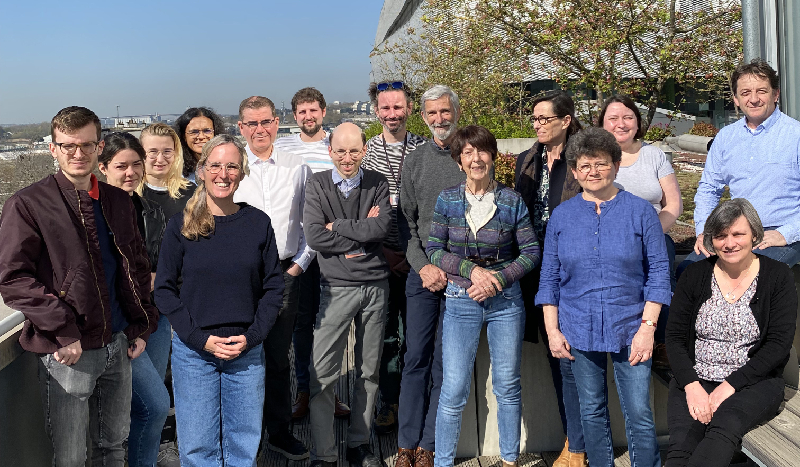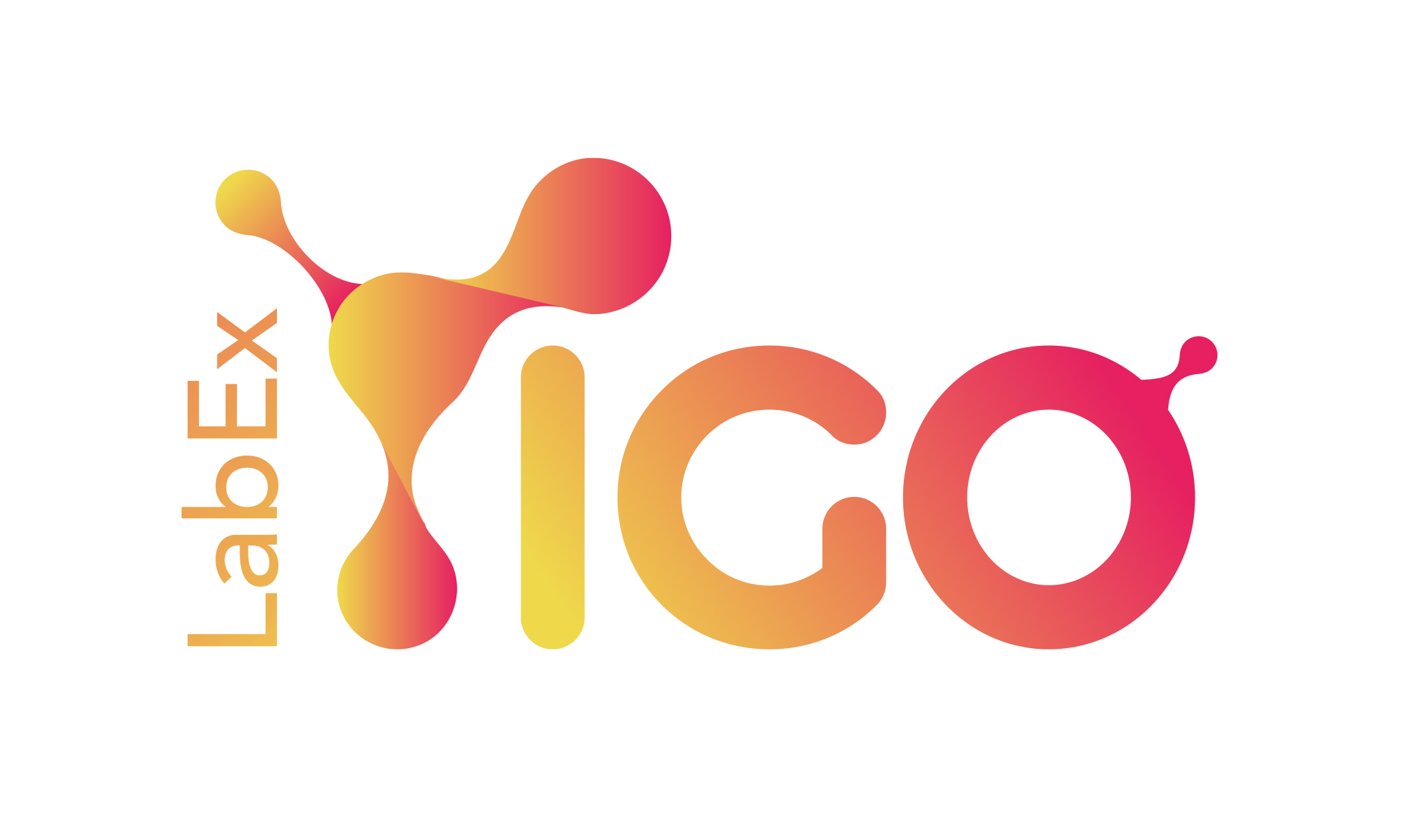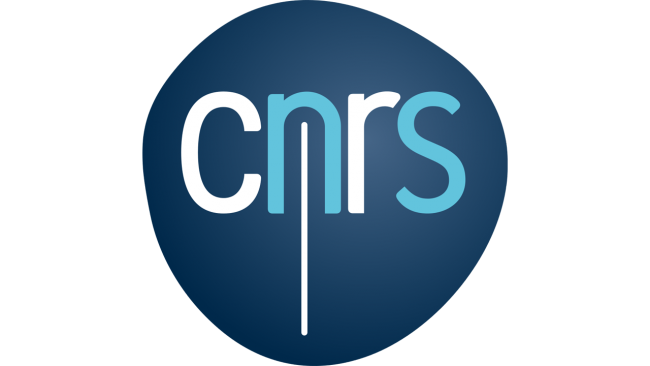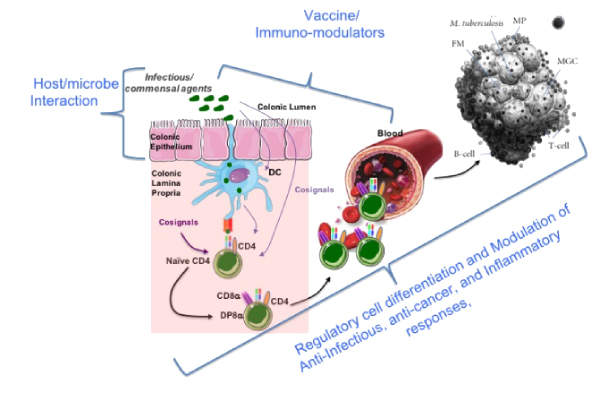The Incit teams
Team 1
Modulation of immune and inflammatory responses
CNRS EMR 6001

Objectives of the research programs
Our team is interested in understanding the development and modulation of inflammatory responses, with a particular interest in several diseases: tuberculosis, enteric viral infections and Crohn's disease. In particular, our project aims to use regulatory immune responses as new targets for the development of novel immunotherapy protocols applied to diseases associated with severe inflammatory events.
Research projects
Our project consists of studying the capacity of an individual to adapt to interactions with environmental or commensal microbes, and to modulate the inflammatory and/or anti-infectious responses that occur during these interactions. It is being developed along 3 complementary lines, starting :
- from the study of the interaction between the intestinal microbiota and host cells (led by J. Le-Pendu/N. Ruvoen), to :
- characterisation of the immune homeostasis induced by this interaction, and use of these properties for the development of innovative immunotherapy approaches (coordinated by F. Altare/F. Jotereau/E. Godefroy). By way of:
- the development of synthetic immunomodulators to control inflammatory responses (directed by B. Pitard).
In parallel to these 3 "historical" axes, our team has been reinforced since January 2022 by the arrival of F. Pecorari and B. Mouratou, who are developing original targeting molecules called "affitins", resembling antibodies but with a smaller size and a better affinity for their targets(https://intercept.cnrs.fr/). Finally, Sylvie Hermouet also leads a group, until her retirement next year, aiming at developing strategies to block the production of monoclonal antibodies induced by abnormal antigenic stimuli before it leads to myeloma formation.
Graphic summary
Highlights
Godefroy et al. Expression of CCR6 and CXCR6 by gut-derived CD4+/CD8a+ T-regulatory cells that are decreased in blood samples from patients with inflammatory bowel disease. Gastroenterology, 2018, 155: 1205-1217.


Themes addressed
Interactions between entericviruses and glycoconjugates of the intestinal epithelium.
Coordinated by J. Le-Pendu, N. Ruvoen
Characterisation of regulatory T cell responses induced by the microbiota and applications for immunotherapy of inflammatory diseases.
Coordinated by F. Altare, F. Jotereau, E. Godefroy
Development of nucleic acid vaccination vectors and use of these vectors as tools to modulate inflammation.
Coordinated by B. Pitard
Development of Affitins for the targeting of molecules of diagnostic or therapeutic interest.
Coordinated by F. Pecorari
The team
5 researchers
5 teacher-researchers
2 PhD students
- M. De Seilhac
- Mr. Verdon
6 ITA
- A. Breiman, IR CHU
- P. Cossard, IE Inserm
- E. Ekaza, IR Inserm
- J. Rocher, TCN Univ
- B. Vaidye, AI Inserm
- C. Vignes, IE Inserm
2 post-docs
- A. Patinec
- C. Terciolo
Scientific publications
Find the major publications of the team in recent years.
Harnessing the natural anti-glycan immune response to limit the transmission of enveloped viruses such as SARS-CoV-2.
Breiman A, Ruvën-Clouet N, Le Pendu J.
PLoS Pathog. 2020 May 21; 16(5):e1008556. doi: 10.1371.
Lipidic Aminoglycoside Derivatives: A New Class of Immunomodulators Inducing a Potent Innate Immune Stimulation.
Colombani T, Haudebourg T, Decossas M, Lambert O, Ada Da Silva G, Altare F, Pitard B.
Adv. Sci. (Weinh). 2019 Jul 15; 6(16).
Expression of CCR6 and CXCR6 by Gut-derived CD4+/CD8α+ T-Regulatory Cells, Which Are Decreased in Blood Samples from Patients With Inflammatory Bowel Diseases.
Godefroy E, Alameddine J, Montassier E, Mathé J, Desfrançois-Noël J, Marec N, Bossard C, Jarry, A, Bridonneau C, Le Roy A, Sarrabayrouse G, Kerdreux E, Bourreille A, Sokol H, Jotereau F, Altare F.
Gastroenterology. 2018 Oct;155(4):1205-1217. doi:10.1053/j.gastro.2018.06.078. Epub 2018 Jul 5.
Neofunctionalization of the Sec1 a1,2fucosyltransferase paralogue in leporids contributes to glycan polymorphism and resistance to Rabbit Hemorrhagic Disease Virus.
Nyström, K., Abrantes, J., Lopes, A.M., Le Moullac-Vaidye, B., Marchandeau, S., Rocher, J., Ruvoën-Clouet, N., Esteves, P.J., Le Pendu, J.
PLoS Pathogens, 2015, 11: e1004759.
High-content screening technology combined with a human granuloma model as a new approach to evaluate the activities of drugs against Mycobacterium tuberculosis.
Silva-Miranda M, Ekaza E, Breiman A, Asehnoune K, Barros-Aguirre D, Pethe K, Ewann F, Brodin, P, Ballell-Pages L, Altare F.
Antimicrob Agents Chemother.2015 Jan;59(1):693-7. doi: 10.1128/AAC.03705-14. Epub 2014 Oct 27.
Contact
Contact
Frédéric ALTARE
frederic.altare@inserm.fr
Website
Nantes
Location
Health Research Institute of the University of Nantes - IRS 2
22 Boulevard Benoni Goullin, 44200 Nantes
About us
Created in 2022, the INCIT(Immunology and New Concepts in Immunotherapy) research unit, directed by Frédéric Altare, is based on the desire to focus thescientific expertise of the immunology and immunotherapy teams on different pathological contexts: inflammation, cancer and infectious diseases.



